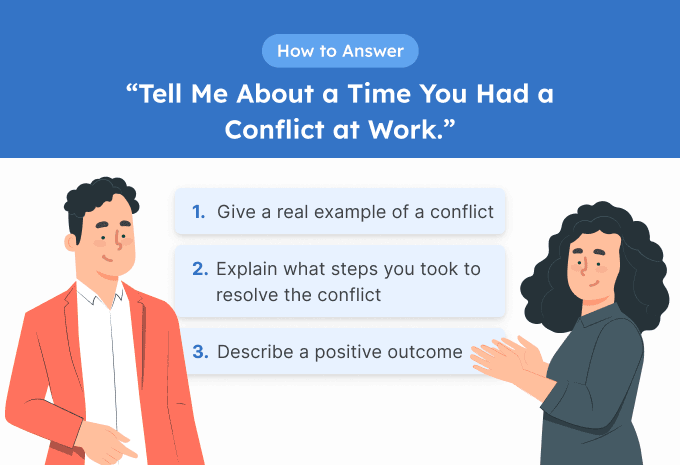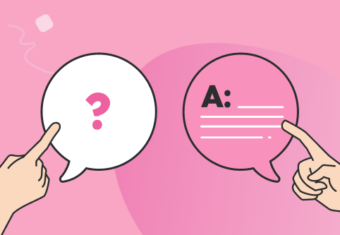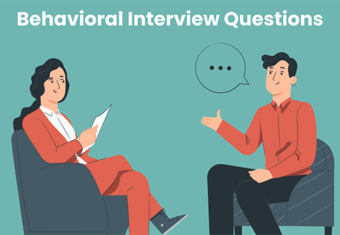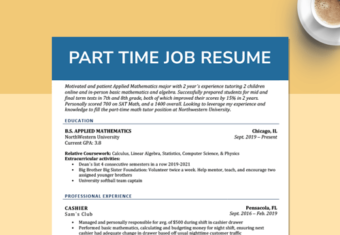Conflicts naturally arise in every job, but how you deal with conflict can tell employers a lot about your attitude in the workplace.
“Tell me about a time you had a conflict at work” is a tricky interview question to answer. It’s difficult to know how to respond without coming across as aggressive or disagreeable.
In this article we’ll tell you why interviewers ask this question in interviews, give you several example answers to draw from, and explain how to answer this question in a way that’ll impress employers.
Why interviewers ask “tell me about a time you had a conflict at work”
Employers ask this common behavioral interview question to get a feel for whether you can maintain composure during conflict and constructively resolve difficult situations.
In particular, interviewers are looking for these skills and qualities:
- Teamwork skills
- Positivity
- Problem-solving skills
- Logic
- Ability to remain calm
- Self-awareness
- Assertiveness
- Leadership skills
- Conflict resolution skills
- Communication skills
- Interpersonal skills
By asking about how you resolve conflicts, interviewers want to confirm that you’d be a good fit for the position and are able to handle challenging scenarios, whether with a colleague, customer, client, or manager.
“Tell me about a time you had a conflict at work” examples
Below are several variations of the prompt “tell me about a time you had a conflict at work,” with examples of how to answer them using the STAR method.
STAR stands for:
- Situation
- Task
- Action
- Result
Structuring your answer using these four parts is the most effective way to answer behavioral questions like “tell me about a time you had a conflict at work”, because it clearly provides employers with real life examples of how you approach and respond to complex situations while placing emphasis on positive outcomes.
1. “Tell me about a time when you had a conflict with a coworker and how you resolved it.”
Situation: At my last job, a coworker and I had a disagreement about how to handle a customer complaint.
Task: While we had differing opinions, we ultimately agreed the most important thing was to make sure the customer was happy.
Action: Rather than becoming defensive, we both decided to calmly express and listen to each other’s ideas. Once we had all the ideas on the table and agreed on the desired result, we were able to combine our ideas to choose a suitable method of navigating the complaint.
Result: We implemented our solution and the customer ended up specifically thanking us for how we handled the situation.
In this example, the candidate demonstrates teamwork, the ability to remain calm, problem solving, and communication skills.
2. “Describe a situation where you disagreed with someone and how you handled it.”
Situation: In my last marketing role, my manager decided to implement a new marketing plan for our team.
Task: However, she was pretty removed from the day-to-day aspects of our team operations, and I felt the new plan may not be in the best interest of the company and I knew it would be better to bring this to her attention.
Action: Rather than becoming defensive, we both decided to calmly express and listen to each other’s ideas. Once we had all the ideas on the table and agreed on the desired result, we were able to combine our ideas to choose a suitable method of navigating the complaint.
Result: We implemented our solution and the customer ended up specifically thanking us for how we handled the situation.
This answer works because it shows that the candidate is proactive, respectful, and inquisitive, while also making the best interests of the company a top priority.
In this case, being able to bring concerns to the attention of a superior and offer valuable suggestions allowed the team to save valuable time and energy that would have otherwise been focused on troubleshooting the new plan.
3. “Give me an example of a time you faced a conflict while working on a team. How did you handle that?”
Situation: While working on an ongoing project at my last company, one team member would consistently not show up to meetings, leaving my other teammates and me to take on extra tasks to hit our targets.
Task: The team was getting increasingly frustrated, and we knew we had to find a solution.
Action: I approached this colleague to explain the situation and ask if there was anything else going on that meant he could not come to the meetings. He explained that the weekly meetings were on his busiest day, and he was struggling with scheduling in time for this project.
Result: We were able to move the meetings to a more suitable day for him, and also more clearly define the weekly tasks of each person. He began joining meetings and we actually improved the efficiency of the meetings. We hit all our targets in this project.
This answer shows how the candidate approached the situation with compassion and curiosity, instead of blame and frustration. By taking initiative and using great communication skills, they were able to avoid a bigger conflict and get the team back on track.
Showing employers that you know how to value and support your coworkers while maximizing efficiency and achieving team goals will make you an attractive candidate.
4. “Tell me about a challenge or conflict you’ve faced at work, and how you dealt with it.”
Situation: One time I saw that one of my coworkers did not follow the protocol of asking for authorization to send goods to clients.
Task: Because this could have serious consequences for the company, I knew I had to address my coworker’s behavior.
Action: I approached them, asked them if they were aware of this, and let them know that they should follow this protocol. I explained that not doing so could end in serious problems for the company during auditing season. When they told me they didn’t care as this way was easier and that I should do it too, I approached my manager and let them know.
Result: The manager was able to refer the issue to HR. The coworker began complying with company protocol and the instance led to the development of a new system to ensure that all team members followed the official protocols.
While not all problems need to be escalated to management, sometimes this step is necessary. This example shows that the candidate attempted to resolve the problem on their own first, but knew when it became important to ask for help.
5. “Describe a time when you needed to manage differences of opinion at work.”
Situation: On my last team, two of the graphic designers had different visions for a client’s project.
Task: This had the potential to affect the entire project negatively, so I took it upon myself to try to guide the team toward a unified design concept.
Action: I took the initiative to schedule a team meeting where we discussed each member’s ideas and concerns. I highlighted common design elements and encouraged collaboration. The team eventually agreed on a cohesive design concept that pleased the client.
Result: The project was successful, and my mediation skills played a crucial role in achieving a unified vision and client satisfaction.
Mediation skills are key to resolving conflicts you’re not directly involved in, and they’re especially important if you’re targeting a managerial role. Emphasizing your mediation skills will show employers that you’re solution-oriented and can be trusted to keep projects on track even when disagreements occur on the team.
How to answer “tell me about a time you had a conflict at work”
While “tell me about a conflict you had at work” is a difficult question, there is a way to formulate a response that will leave your interviewers with a good impression of you.
Here’s a simple three-step approach to impress your interviewer when they pull out the tough “tell me about a time you had a conflict at work” question.
1. Give a real example of a conflict
There are many different types of conflict, so it’s important that you choose an appropriate example that can highlight your relevant skills and experience.
Choose a real situation that is easy to explain and ended with positive results. Some good examples might be:
- Disagreement with a coworker or manager
- Dealing with a challenging client
- Clashing work or management styles
- Challenges encountered when working on a team
- Miscommunication between departments
- Advocating for a colleague
- Turning down a task that conflicts with your values
2. Explain what steps you took to resolve the conflict
Get clear on the steps you took to navigate and resolve the conflict. Think about what positive skills you are showing when you describe these.
- Did you solve a problem?
- Did you analyze different options?
- Did you actively listen and offer solutions?
- Did you show authority while still being respectful?
- Did you act in the best interests of the company, or of your colleagues?
3. Describe a positive outcome
Be sure to include a positive outcome, otherwise employers won’t be impressed.
- Were you and/or others able to learn something?
- Did it result in a new initiative being developed?
- Did you strengthen your relationships?
- Did you manage to make a client happy, hit targets, or come up with a successful strategy?
What to avoid when answering conflict questions
When you’re asked “tell me about a time you had a conflict at work,” not all answers are equal. Employers want to see all the positive attributes that make you a good fit for the position, so avoid these things when crafting your response:
Saying you never have conflicts
Don’t sidestep the question by saying you never have conflicts with people at work. This may seem unrealistic and could actually put you in a negative light as someone who avoids conflict.
The interviewer is asking this question for a reason. They genuinely want to get an idea of how you handle tough situations, so giving them no information can be unhelpful and put them off hiring you.
Painting yourself as right and others as wrong
Your employer does not expect you to be right all the time. Don’t be afraid to admit you’ve made mistakes, as long as you can show how you were open to learning from them and improving.
Pointing fingers at others also won’t help you get the job. Instead, it will raise red flags for employers and hurt your chances of landing the job, so be kind and generous when describing your conflicts.
Interviewers are looking for people with well-developed soft skills who can listen to others, work on a team, and remain willing to face challenging situations.
Using an example of an unresolved conflict
Sometimes it can be hard to think of good examples to use for questions like these, but that doesn’t mean you should use a poor one.
Telling employers about a conflict that you had that was left unresolved will send the message that you don’t follow through to improve things when needed, and leave them with a bad impression of your conflict management abilities.
Even if you have to resort to a more minor conflict, choose one that exemplifies your conflict resolution skills and ability to learn and improve from challenges.
Giving a vague answer
While your response shouldn’t be overly in-depth (to avoid rambling or revealing confidential information), an answer that’s too vague won’t give the employer insight into how you actually handle conflicts in professional settings.
Provide enough context that the interviewer will be able to understand the issue you faced, describe the specific steps you took to solve it, and leave out unnecessary details that don’t add anything to the story.
Additional interview resources
For more help preparing for your interview, check out some of our other articles below:
- Common phone interview questions and answers
- Best questions to ask in an interview
- When and how to ask for feedback after an interview
- “Why are you suitable for this job?” sample answers
- How to answer “What do you like least about your job?”
- “Tell me about a time you failed” sample answers
- How to answer “Why did you leave your last job?”
- How to answer “Walk me through your resume”
- How to answer “What are your weaknesses?”
- How to answer “Tell me about yourself”
- How to answer “Why should we hire you?”
- How to answer “What is your greatest strength?”
- How to answer “Where do you see yourself in 5 years?”
- “What is your greatest achievement?” example answers
Click to rate this article
4.5 Average rating


















